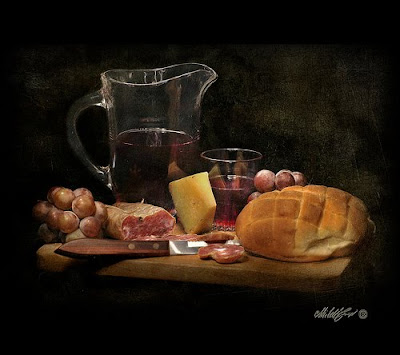
I've been thinking about the interview linked below in which Lierre Keith discusses her growing awareness that plants have a form of sentience, volition, and ability to communicate. She recounts how, as a vegan, she didn't want to accept this awareness because it meant that, in order to survive, she had to kill something sentient.*
We have (and Earth knows, I'm not the first to discuss this) such a shadow relationship with Death in Western culture. To a greater extent than at any other time or place in human history, our way of life is built upon and requires massive amounts of death. We spend billions of dollars on redundant weapons, even when we say that we don't have money for schools, or roads, or the green energy programs that might save the planet. We are, pace Mr. Orwell, always at war with someone. We cause the extinction of species after species. We kill forest after river after ocean and shrug it off as just a cost of doing business. We kill off native peoples whenever and wherever they "get in our way" (by which, we mean, "have been living forever in a place that we now want"). Our movies are full of death (preferably accomplished by huge explosions or major car crashes -- nope, no sexual symbolism there) and our children amuse themselves for hours with video games in which the object is to kill other people.
And, yet, Death is the great unmentionable. We have moved the harvesting of the plants we eat and the slaughter of the animals whose flesh we consume out of sight. We send our old people away to die in hospitals or nursing homes. We won't even use the word "death" -- we say that someone "passed on," or "went to their final rest." And we want, rather desperately, as Keith did, to pretend that somehow we can have the life that we have without ever causing any Death.
What happens, though, when we face up to the fact, as Keith did, that everything is alive, that everything is aware, that we must, truly, cause some death in order to live? The Randian response is to shrug, announce that only the strong survive, and to become even more willing to wreak death and destruction. After all, if even picking an apple off a tree involves taking from a sentient being, then why not take the land away from the forest, why not dump chemicals into the Danube? Why not make money selling games to children that teach them that it's fun to blow up other people? Head to McDonalds and have a triple bacon burger!
Another response, though, is to recognize the gift of the slaughtered animal, the harvested corn. That response might require, as Derrick Jensen suggests, that, when we kill a salmon, we become responsible to Salmon. It suggests that animals be raised and slaughtered humanely (to coin a phrase) and with gratitude for their sacrifice. It suggests that we not grow crops in huge monoculture factory farms and that we not drench them in pesticide and petroleum-based fertilizer. It suggests that we spend time in meditation and religious ritual, coming into right relationship with Death, with our planet, our landbase, our food. And if that interferes with the cost of doing business (aka imposing externalities), then it is business that must adjust and sacrifice.
As we head into Samhein, this area of our relationship with Death is one I'd like to see more Pagan groups incorporate into their observations. Our religion, more than any other Western religion, is at least willing to worship the relationship between life and death, as well as to focus upon the interconnectedness of all beings. We could, I think, begin to help our culture to come into a better relationship with reality, which could, in turn, help us to come into a better relationship with our planet and the other beings who share it with us.
How squeamish does Death make you? Do you still believe that you can live on this planet without causing Death? How does the traditional "Rule of Three" both recognize and obscure the truth about the relationship between our lives and death? What, realistically, can you change in order to live in better relationship with Life, Death, Earth, Food? What rituals would help you to do this?
*I am not making any judgments here about what people eat or don't eat. It's interesting to me how our culture considers eating to be such a moral issue; people feel free to judge other people for what they eat, how they eat, how much they eat or don't eat, etc. It's almost impossible to read a newspaper or magazine without finding articles about how one "should" eat and it's almost impossible to mention, say, veganism without starting a war about how people "should" eat. And yet, the deep moral questions behind our food production system go unmentioned. Good sign that there are some shadow issues involved.
Picture found here.



